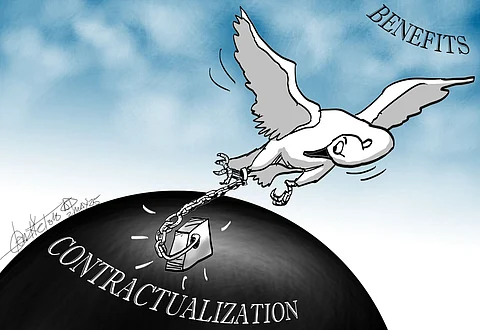
- NEWS
- the EDIT
- COMMENTARY
- BUSINESS
- LIFE
- SHOW
- ACTION
- GLOBAL GOALS
- SNAPS
- DYARYO TIRADA
- MORE

Despite numerous promises by leaders across administrations, the practice of contractualization — more commonly known as “endo” or “end of contract” — continues to hound the Filipino workforce. It is both sad and disappointing that this exploitative system remains rampant in many industries, especially when it has long been recognized as a grave injustice to laborers struggling to make ends meet.
Endo refers to the hiring practice where workers are employed for less than six months to avoid regularization and the benefits that come with it. After their contract ends, these workers are either let go or rehired under another short-term contract. This cycle robs them of job security, benefits like health insurance and paid leave, and even their sense of dignity as laborers contributing meaningfully to the economy.
While the Constitution guarantees the right to security of tenure, the continued prevalence of endo starkly exposes the gap between the law and its enforcement. The Department of Labor and Employment (DoLE) has issued regulations to curb illegal contracting, and there have been legislative attempts to ban it altogether.
Yet, loopholes in labor policies and weak implementation mechanisms have allowed companies to skirt the law. Instead of absorbing workers as regular employees, many businesses use third-party manpower agencies to dodge accountability.
What makes endo particularly insidious is how it keeps workers perpetually insecure. A janitor, factory worker, or sales clerk can spend years working continuously in the same company, only to remain a “new hire” on paper.
These workers are denied the opportunity to grow within their roles or access employer-sponsored benefits, such as Social Security System (SSS) contributions, Pag-IBIG housing benefits, and PhilHealth coverage. They live from paycheck to paycheck, often unable to plan for the future or even provide the basic needs for their families.
This system is also damaging to the broader economy. Workers who feel disposable are less likely to be productive, innovative, or loyal to their employers. Moreover, by discouraging formal employment and failing to provide stable incomes, contractualization deepens poverty, weakens consumer demand, and exacerbates social inequality.
The persistence of endo reflects a failure of political will. During his election campaign, former President Rodrigo Duterte promised to abolish endo, yet the problem remained largely unresolved during his term. Current efforts by the Marcos Jr. administration have yet to make a significant dent. Business groups argue that flexibility is necessary for competitiveness, especially for seasonal industries. But flexibility should not come at the cost of workers’ rights and welfare.
What is needed is a genuine commitment to reform. Government must strictly enforce labor laws, penalize abusive practices, and support small and medium enterprises in transitioning to more sustainable and humane employment models. At the same time, we must foster a culture that values labor not just as a cost to minimize, but as a vital part of national development.
The Filipino worker deserves better. Contractualization is not just a labor issue — it is a moral issue. As long as “endo” exists, there can be no real dignity in labor. The promise of decent work remains a dream deferred for millions. It is high time we turned that dream into reality.
